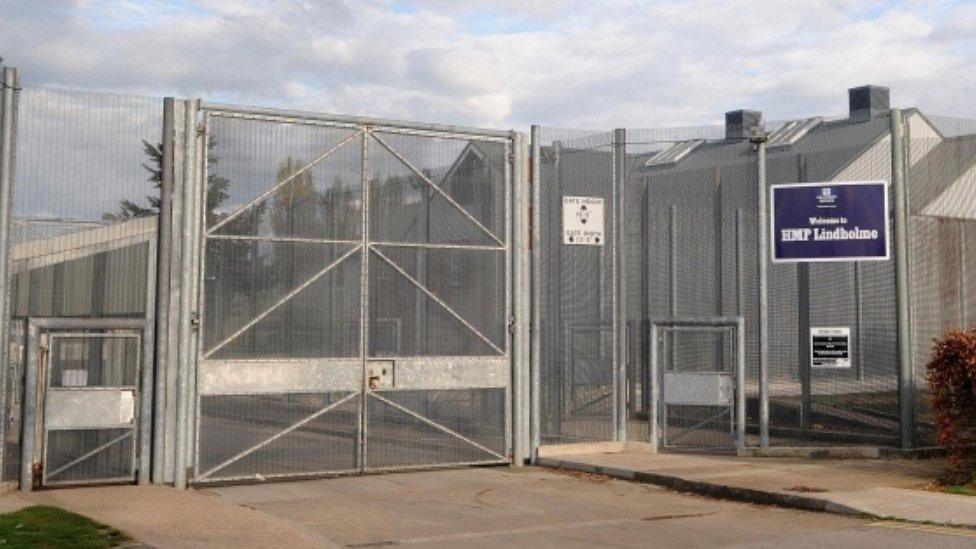Lindholme Prison: Policing perimeter 'virtually impossible'
- Published

HMP Lindholme's perimeter fence is thought to be the longest prison barrier in the UK
The three-mile perimeter of a prison where drugs are readily available is "virtually impossible" to constantly police, a custodial manager has warned.
Packages containing the drug Spice and mini mobile phones are regularly thrown over the fence at HMP Lindholme, which is surrounded by public rights of way.
The BBC has been given access to the site to speak to staff and prisoners about the challenges it faces.
Its governor said it was adding further measures to help seize banned items.
The Category C prison, near Doncaster, is one of 10 jails the Ministry of Justice has said have "acute problems" with high drug use, violence and building issues.
In August, the government announced £10m to improve security at the 10 jails, with more than half of the list in Yorkshire.
Prisons Minister Rory Stewart previously told the BBC he would resign if he did not manage to reduce drugs and violence levels in the target jails in a year.
At Lindholme, the BBC was told:
Banned items were thrown over the perimeter fence "every other day"
Packages were thrown over with fish hooks attached so prisoners could "fish" for them from their cells
Inmates thought the drug Spice had made jails "ultra-dangerous"
Prison staff were assaulted several times a week and morale was lower than ever
What is being smuggled into the prison?
In August, a bag containing 50 mini mobile phones was thrown over the prison fence in the hope it would reach prisoners seeking communication with contacts in the outside world.
The mini phones can be purchased for about £25 online but staff at HMP Lindholme said the bag had a "prison value" of £25,000.
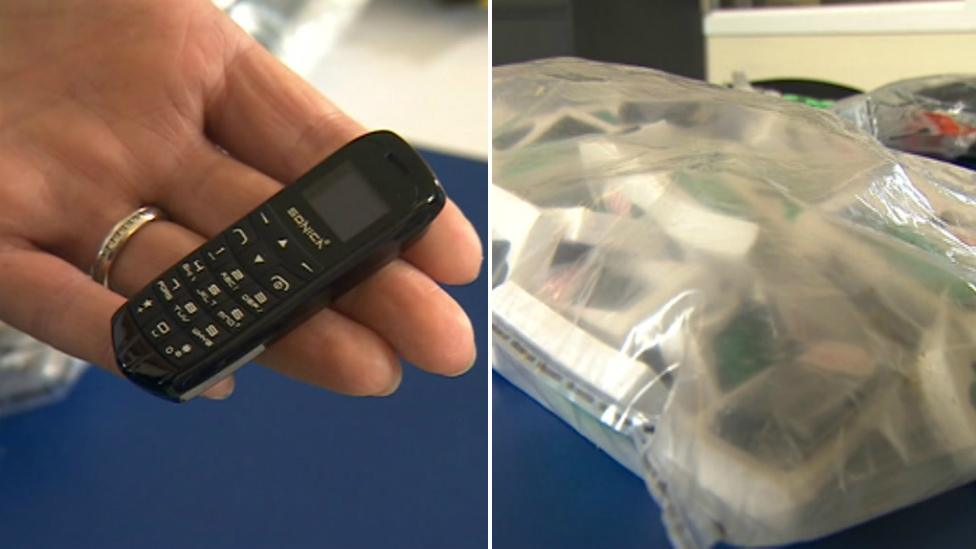
A bag containing 50 mini mobile phones was seized at the prison in August
Mobile phones, which are banned in prisons, can be used to facilitate more crime and intimidate victims from behind bars, according to the Ministry of Justice.
Miniature phones have been smuggled internally to avoid detection during prison security checks, with some models virtually metal-free.
Other items seized include the illegal psychoactive drug Spice, steroids and tobacco, with items often packaged inside empty crisp packets or drinks cartons to avoid drawing attention.
Last month, a female prison officer at HMP Lindholme was arrested and charged with trying to smuggle drugs and mobile phones into the prison. Victoria Sked, 26, of Station Road, Stainforth, was remanded in custody.
Why is it difficult to seize all the packages?
HMP Lindholme, built on a former 40-hectare (100-acre) RAF airbase, has a three-mile perimeter fence - thought to be the longest barrier surrounding a prison in the UK.
The land surrounding the prison includes woodland, open fields, residential areas and a nature reserve, with alarms, CCTV and dog patrols among the methods used to battle smuggling attempts.
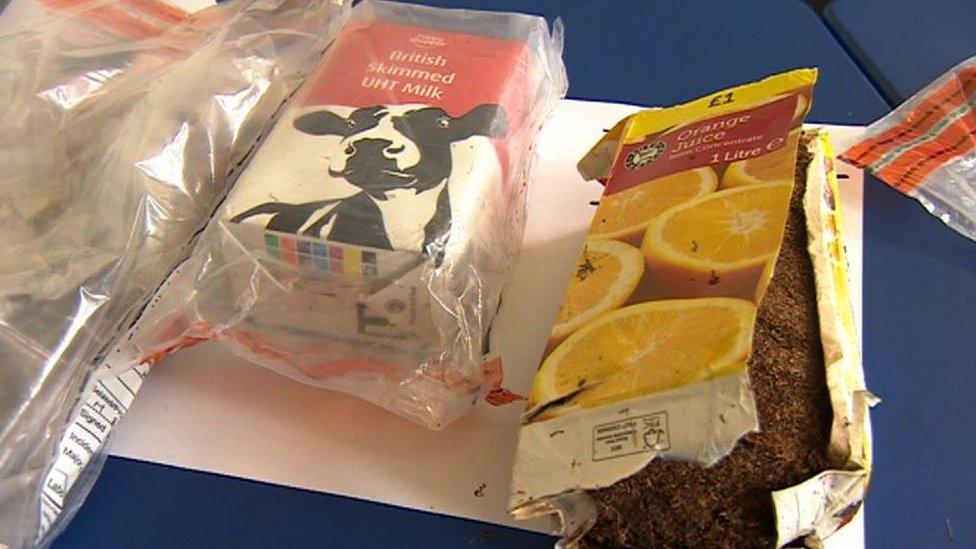
Cartons of drink and crisp packets are used to divert attention from contraband items hidden inside
Paul Taylor, regional search team custodial manager, said the frequency of banned items being thrown over the fence "can be every other day".
"All day long you've got members of the public walking around the perimeter - it's virtually impossible to police the perimeter seven days a week, 24/7," he said.
Packages covered in fish hooks have been flown over the fence using drones, with prisoners "fishing" for the items despite being locked in their cells.
Mr Taylor said: "If it's during the day, they aim for near the workshops or at night they aim for the edge of the wings, so they can be pulled in by the prisoners by casting lines out the cell windows."
Smuggled mobiles inside the prison are used to organise a drop, with multiple packages sometimes thrown over the fence at once while prisoners are outside exercising.
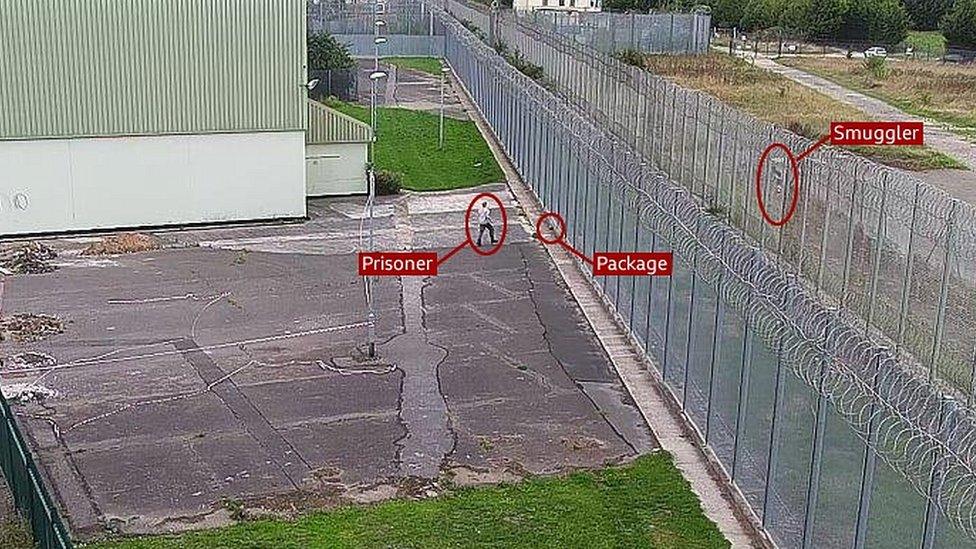
Package drops are often organised using mini mobile phones smuggled inside the prison, with the pictured prisoner meeting the accomplice at the prison boundary
The prison is introducing further measures including extra dog patrols, increasing perimeter fencing and adding netting over exercise areas to lower the frequency of successful smuggling attempts.
Police also carry out "no-notice" searches of prison visitors, staff and cars parked at the prison.
How has the prison changed over the past decade?
During his annual report for 2017-18, external, the chief inspector of prisons Peter Clarke said the increase in levels of violence seen inside prisons in England and Wales over recent years was continuing.
He connected the "ready availability" of drugs to much of the violence, with similar patterns seen at HMP Lindholme.
Prison staff in England and Wales took part in widespread protests on 14 September over "unprecedented violence" in jails. They included more than 80 staff members from Lindholme prison.
"Psychoactive substances have been a real issue for the prison service and society in itself so I think things have been difficult in that sense," prison governor Simon Walters said.
More than two-thirds of prisoners claimed it was easy or very easy to get hold of drugs, with 27% saying they had developed a problem with drugs since being in the prison, a recent inspection found.
Lindholme holds more than 1,000 inmates, with about 200 of these being identified as being members of organised crime gangs.
Mr Clarke said "further progress will be difficult to achieve" in tackling drugs at the prison because of the lengthy boundary and the number of inmates linked to organised crime.
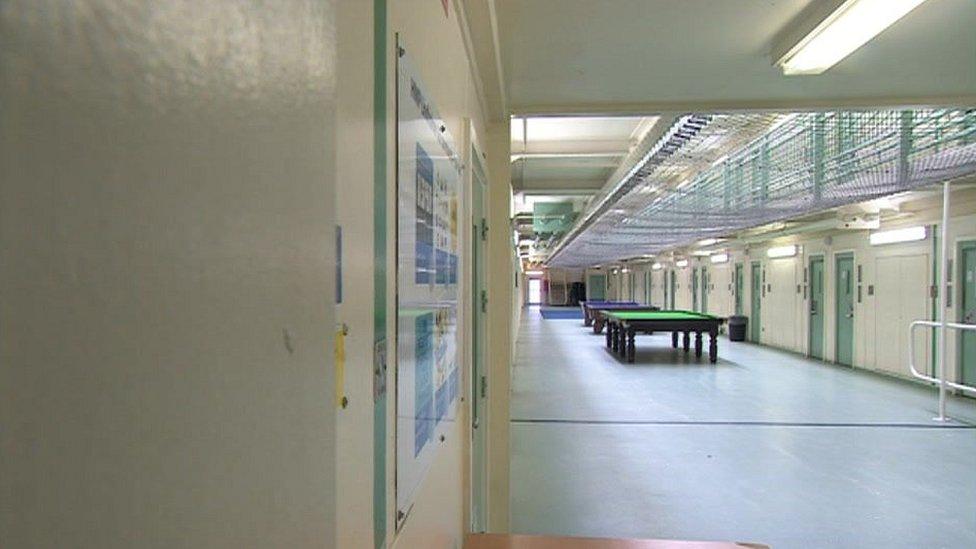
HMP Lindholme is a Category C prison with 1,000 inmates
The knock-on effect of the drug Spice could lead to "self harm, violence and ultimately some deaths in custody", Mr Walters added.
Figures from the Ministry of Justice showed the number of assaults at the prison has quadrupled in a decade, rising from 80 incidents in 2008 to 345 incidents in 2017.
Over the same period there has also been a six-fold increase in the number of incidents in which inmates have self-harmed.
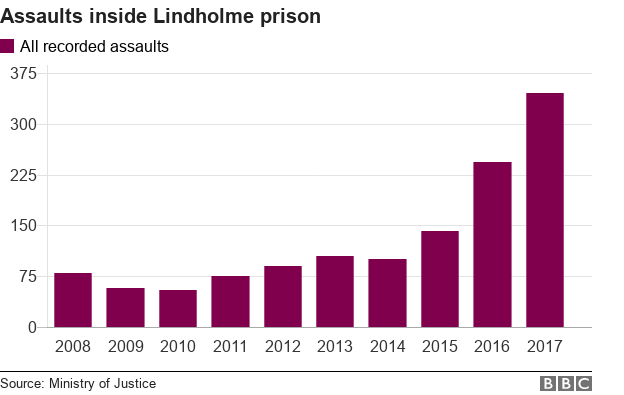

Life inside Lindholme
"You see drugs on a daily occurrence - Spice causes major problems not just for us inmates, but for staff as well," said an inmate, who asked not to be named.
"There's no way that staff police where it's coming in or how it's coming in - not all the time. They do a good job in getting rid of some of it but they don't get rid of all of it.
"A lot of officers are doing the job for three months, then packing it in because they can't handle the inmates, the aggression, the tempers, the daily flare ups, the fights.
"You can never actually feel 100% safe in prison, you're in a very volatile environment, you're surrounded by very dangerous people. You can never really let your guard down.
"With the introduction of Spice, prisons have become ultra-dangerous, they really have, it's a very dangerous place - scary."

What is staff morale like?
The officers from HMP Lindholme who took part in the national protest over "unprecedented violence" in jails did so against a backdrop of rising assaults in their workplace.
Over the past 10 years, the number of assaults on staff by prisoners at Lindholme has quadrupled, rising from 23 attacks in 2008 to to 106 in 2017.
A prison officer, who asked to remain anonymous, said staff were being assaulted "every other day" and morale was "the lowest I think it's ever been".
"If you're not being assaulted they're in your face, they're verbally aggressive," he said.
"When Spice wasn't around it was nowhere near as bad, it's definitely added to the melting pot, made it a lot worse."

Staff carry out regular searches of the perimeter fence at HMP Lindholme
Some officers at the prison are to receive training in how to take evidential statements for use in court and how to forensically preserve items, including packages thrown over the fence, to speed up the process of arrest and further charges.
The prison officer continued: "I've been assaulted, it affects your life inside jail and outside jail.
"I can't walk down a corridor, if it gets too busy I get panic attacks, I struggle."
How is the prison looking to make improvements?
The most recent inspection of HMP Lindholme did find some improvement in safety at the prison and found positive aspects in its approaches to equality, diversity and dealing with discrimination.
It acknowledged the prison's leadership having a number of "credible plans" in the fight against organised criminals "determined to continue to ply their trade".

Simon Walters says the government funding assigned to the site "will make a difference"
Governor Mr Walters said: "We've got really good working relationships with the police, we've had a recruitment drive and we're now in a good place with staffing.
"The Prison Service is piloting initiatives where we can block the use of mobile phones and data, we're looking at using that technology in the near future at Lindholme."
The prison will receive approximately £1m of the government funding assigned to the 10 jails, with the money going towards security and leadership training schemes.
- Published14 September 2018

- Published23 August 2018
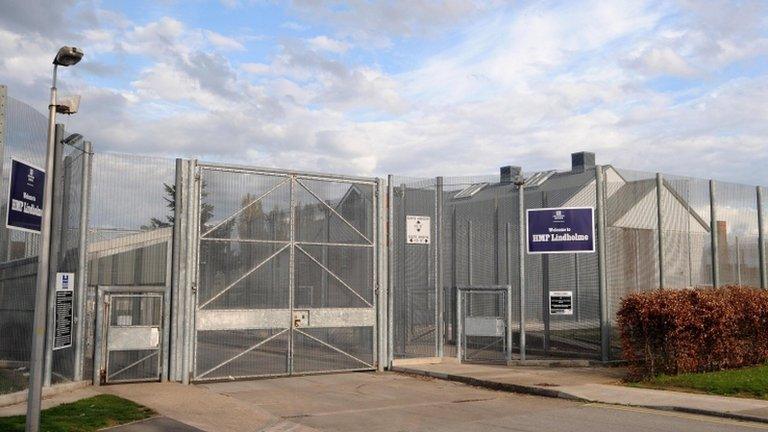
- Published3 July 2018

- Published6 February 2018
